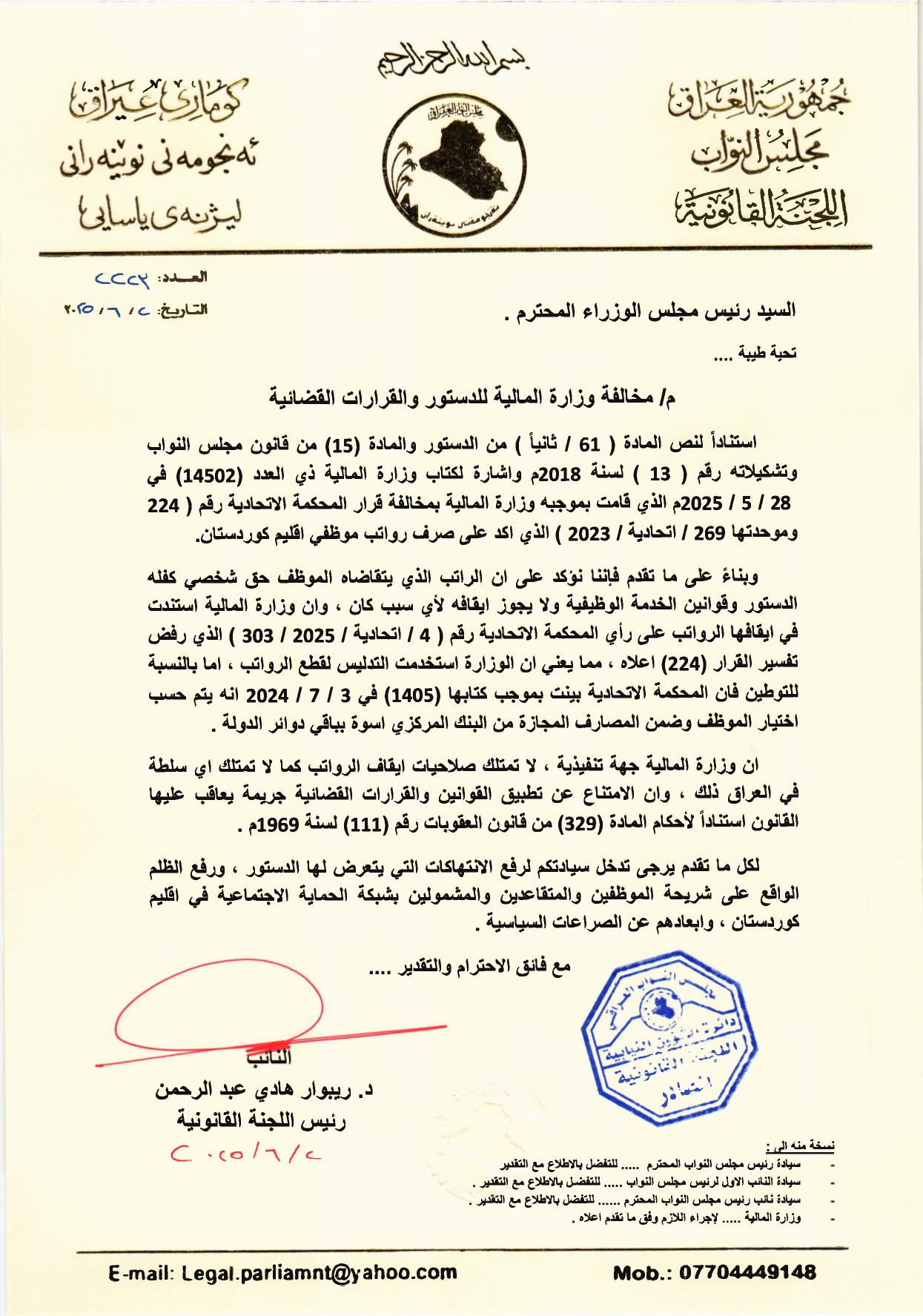'Finance Minister Committed Constitutional Crime by Blocking Kurdistan Salaries,' Says Top Iraqi Lawmaker
Iraqi MP Rebwar Hadi accused Finance Minister Taif Sami of violating the Constitution by halting Kurdistan Region salaries, urging PM Sudani to intervene. Citing court rulings, he warned the move is illegal and harms thousands, demanding immediate reinstatement before Eid.

By Kamaran Aziz
ERBIL (Kurdistan24) – In a dramatic escalation of the salary crisis affecting the Kurdistan Region, the Head of the Legal Committee in the Iraqi Parliament has accused Federal Finance Minister Taif Sami of committing a constitutional violation and a punishable criminal offense by halting the salaries of Kurdistan Region employees. He urged Prime Minister Mohammed Shia al-Sudani to intervene immediately to end what he described as a blatant injustice.
In a strongly-worded official memorandum dated Monday, June 2, 2025, and addressed to Prime Minister al-Sudani, MP Rebwar Hadi denounced the Federal Finance Ministry’s decision to withhold salaries as unconstitutional and in defiance of binding judicial rulings. Hadi warned that such actions undermine the rule of law and directly harm thousands of Kurdish families.
Citing Article (61/Second) of the Iraqi Constitution and Article (15) of Law No. (13) of 2018 governing parliamentary conduct, the memorandum referred explicitly to the Ministry of Finance’s letter No. (14502), dated May 28, 2025. That letter, Hadi noted, unlawfully ignored the Federal Supreme Court’s Decision No. (224 Unified 269/Federal/2023), which guarantees the disbursement of salaries to the Kurdistan Region’s public servants.
“Salaries are individual rights protected by the Constitution and Iraq’s civil service laws. Under no circumstances may they be suspended,” Hadi wrote.

The memorandum went on to expose what it described as a deliberate legal misinterpretation by the Finance Ministry. According to Hadi, the Ministry relied on Federal Supreme Court Ruling No. (4/Federal/2025/303) to justify suspending salary payments while sidestepping Ruling No. (224), thus creating what he called a fabricated legal basis for its actions.
Regarding the salary payment mechanism, Hadi noted that the Federal Court, in its correspondence No. (1405) dated July 3, 2024, had already clarified that salaries can be paid through the "Tawteen" (salary domiciliation) system, enabling employees to choose approved banks regulated by the Central Bank, consistent with practices across other Iraqi institutions.
Crucially, Hadi reminded the Prime Minister that the Finance Ministry, as an executive entity, lacks the legal authority to unilaterally suspend salaries. “No institution in Iraq, including the Ministry of Finance, has the legal mandate to obstruct the enforcement of laws and judicial rulings,” he said, warning that such obstruction constitutes a crime under Article (329) of Penal Code No. (111) of 1969.
He urged Prime Minister al-Sudani to take decisive action: “This injustice must be halted. The matter should not be politicized. These are the livelihoods of innocent citizens, and the government must act to protect them.”
The controversy intensified last week when Finance Minister Taif Sami informed the Kurdistan Regional Government (KRG) that salary transfers would be suspended due to budget constraints. Citing non-compliance by the KRG in delivering 19.2 trillion dinars worth of oil and non-oil revenues to the federal treasury, the Ministry claimed its decision was in line with the Federal Court's rulings and the 2024 budget law.
However, legal experts and Kurdish officials argue that the suspension violates both prior court decisions and the constitutional principle of financial entitlement for public employees.
As tensions rise, pressure is mounting on Baghdad to resolve the deadlock ahead of the Eid al-Adha holiday, with calls intensifying for the immediate reinstatement of salary payments to Kurdistan Region employees.